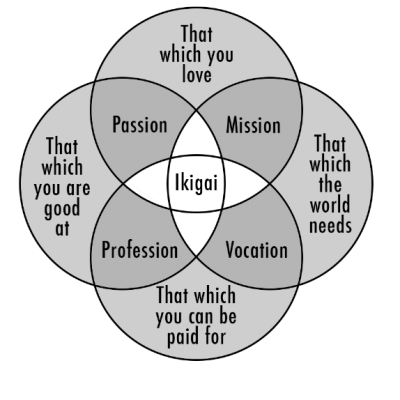Ikigai is a Japanese notion which stands for ‘a reason for being’ or ‘a belief that one’s life is worth living’. It refers to having clarity around the balance between mission, vision, passion and profession and it is imbued with a sense of meaning. Ikigai is extremely powerful.
Dan Buettner, who studies the world’s Blue Zones, communities whose elders live fulfilling lives to record setting age, identified this concept as a key component to the longevity of life. One such area is the Japanese community of Okinawa, an area that is inhabited by people who have a very clear reason as to why they wake up each morning. A community that includes the 100-year-old fisherman who continues to catch fish for his family three times per week and the 102-year-old woman who still feels it is her duty to actively look after her great-great-great-grand daughter. These people have lives that they consider to be highly fulfilled.
A 7-year longitudinal Japanese study by Sone, consisting of more than 43,000 Japanese adults, looked into some of the impacts of having a sense of purpose. They concluded that those who demonstrated a sense of Ikigai also experienced better health and lower levels of stress; they were also more likely to be educated, employed and in long term relationships and what’s more, they found a strong reciprocal correlation with life expectancy: 95% of individuals who scored highly on Ikigai were alive seven years after the initial survey versus only around 83% of those who did not report Ikigai, even after other risk factors had been taken into account. The results clearly highlight the benefits of having a sense of worth, meaning and purpose in one’s life.
We do not have to go and live in Okinawa or become a monk in order to discover our purpose in life, and we can find our purpose in the simplest of things. Take a moment (and yes put your phone away) and really ask yourself ‘what are my real values in life?’ Look within yourself to discover what you find truly important and fulfilling. A sense of Ikigai can be found anywhere and everywhere; in your life at work and away from it.
Ikigai is not biased towards only good times in our life, even in difficult moments we can feel a sense of Ikigai. It may feel like a rather ‘untouchable’ phenomenon, but this visual may help you realise that Ikigai is always within your reach. Answer the four outside questions and see where the strengths and weaknesses are. More importantly think about how you can create even greater balance!

